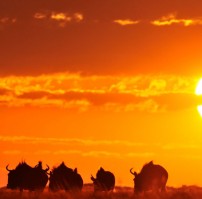 The great plains of Zambia lie in the west of the country along the border with Angola. It is here in the Liuwa National Park, the traditional royal hunting grounds of the King of Barotseland, that Africa’s second largest herbivore migration takes place.
The great plains of Zambia lie in the west of the country along the border with Angola. It is here in the Liuwa National Park, the traditional royal hunting grounds of the King of Barotseland, that Africa’s second largest herbivore migration takes place.
Herds of wildebeest gather in the north-west at the beginning of the dry season to slowly graze their way southwards across the grassy plains over the next 5-7 months until the onset of the rains. En route, they’ll be accompanied by herds of zebra, tsessebe, oribi and lechwe, and hunted down by large packs of hyaena, the dominant predator, cheetah and wild dog. They remain in the south during the rains, calving and going through the rut until they start the long journey north-west again.
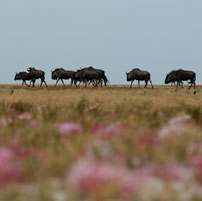 Liuwa is remote. It lies a 4 hour drive west across the floodplains of the mighty Zambezi from Mongu, and even in the dry season, is accessible only by four-wheel drive, boat or charter flight. The terrain is largely flat, the seasonal grassy floodplains dotted occasionally with wooded islands.
Liuwa is remote. It lies a 4 hour drive west across the floodplains of the mighty Zambezi from Mongu, and even in the dry season, is accessible only by four-wheel drive, boat or charter flight. The terrain is largely flat, the seasonal grassy floodplains dotted occasionally with wooded islands.
For years, Liuwa suffered from lack of investment and uncontrolled hunting but for the last 12 years, this remote National Park has been run by the African Parks Foundation. The quality of their management is hard to deny – the populations of 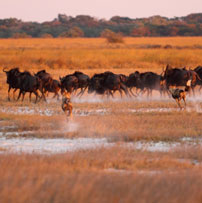 wildebeest have increased three-fold, zebra almost doubled, and there are similar results amongst other species. They have also been responsible for the reintroduction of buffalo, eland, and most recently lion. Other species thought to be extinct in the park are also starting to reappear including roan antelope and a pack of wild dogs.
wildebeest have increased three-fold, zebra almost doubled, and there are similar results amongst other species. They have also been responsible for the reintroduction of buffalo, eland, and most recently lion. Other species thought to be extinct in the park are also starting to reappear including roan antelope and a pack of wild dogs.
The birdlife too is spectacular with over 330 species currently recorded. Liuwa supports globally important populations of crowned and wattled cranes, various storks, and other waterbirds.
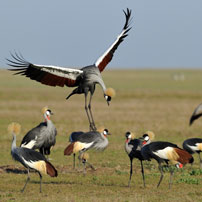 Visitor numbers to this great wilderness are low. Over the last decade or so, Robin Pope Safaris have run a limited number of small group fly-in safaris to the park. Today, you get that opportunity with Time and Tide, owners of Norman Carr Safaris and Chongwe Safaris, who have won the concession rights and will be opening a lodge in 2016.
Visitor numbers to this great wilderness are low. Over the last decade or so, Robin Pope Safaris have run a limited number of small group fly-in safaris to the park. Today, you get that opportunity with Time and Tide, owners of Norman Carr Safaris and Chongwe Safaris, who have won the concession rights and will be opening a lodge in 2016.
For this year, their departures make use of Matamanene Bushcamp, a simple but comfortable camp set on an island of trees surrounded by plains. With departure 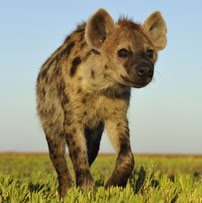 dates in May, June and early July, and again in late October, November and early December, you too can experience the Liuwa for an exciting 4 or 5 nights from just £3000.00 per person (ex Lusaka).
dates in May, June and early July, and again in late October, November and early December, you too can experience the Liuwa for an exciting 4 or 5 nights from just £3000.00 per person (ex Lusaka).
Click here to see the BBC’s wild dog hunt footage taken in Liuwa
